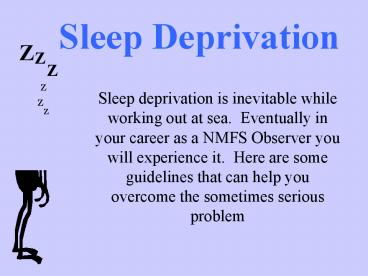Sleep Deprivation - PowerPoint PPT Presentation
1 / 11
Title: Sleep Deprivation
1
Sleep Deprivation
Z
Z
Z
Z
- Sleep deprivation is inevitable while working out
at sea. Eventually in your career as a NMFS
Observer you will experience it. Here are some
guidelines that can help you overcome the
sometimes serious problem
Z
Z
2
Observers work long unusual hours on some
deployments that cause sleep deprivation. The
body needs rest and deprivation accumulates over
time. A compromise can be achieved between work
and sleep through successful resting techniques.
3
What is Sleep?
- 1.) Biological state that is caused by
the release of specific neurons in certain parts
of the brain
non REM 80 minutes
2.) It involves an alternate cycle of non-REM and
REM. The cycle consists of 80 minutes of non-REM
and 10 minutes of REM
REM 10 minutes
3.)This 90 minute cycle is repeated 3-6 times
during the night
90 minute cycle
4
Signs of Sleep Deprivation
- Increased sleepiness and fatigue
- weariness
- poor attention and motivation span, especially
- for boring tasks requiring sustained
concentration - (i.e. tallying fish/hooks on a longline vessel)
- Memory Lapses
- Decreased initiative, judgement ability and
- decision making
- Increased irritability
5
Suggestions for Dealing with Sleep Deprivation
1. Allow at least 4 hours of uninterrupted sleep
each day to maintain minimal performance
2. Attempt frequent power naps20 min. or 90
minutes in length(A 60 minute cycle causes
waking during REM cycle of sleep and you will
wake up feeling more irritable, less refreshed
and disoriented
6
Cover your eyes from natural light when
attempting to rest. Melatonin is the hormone
our body produces to make us sleepy. The darker
it is the more Melatonin we produce
7
Tired workers often rely on perhaps the most
widely abused drug CAFFINE! Available in
coffee, tea, soda and chocolate, caffeine can
seemingly relieve the effects of sleep
deprivation. Use stimulants like these
sparingly
8
If possibleavoid use of antihistamines, motion
sickness medication, alcohol and all other drugs
that will sedate
9
Create the most comfortable sleeping arrangement
possible, that is conductive to your normal sleep
pattern
(considering what you are provided with on some
vessels may make this difficult!)
10
Between sets/haulbacks attempt to have small
snacks of high carbohydrate foods. Breads, rice,
cereals, potatoes, some baked goods and apples
are good sources. The carbohydrates will provide
energy to fuel body function and prevent
drowsiness
11
Avoid large amounts of protein. Protein will
worsen your drowsiness because the body has to
break down and digest the protein. The body has
to break down and digest the protein. Meats,
dairy products (cheese,eggs and fish) and legumes
all contain large quantities of protein































